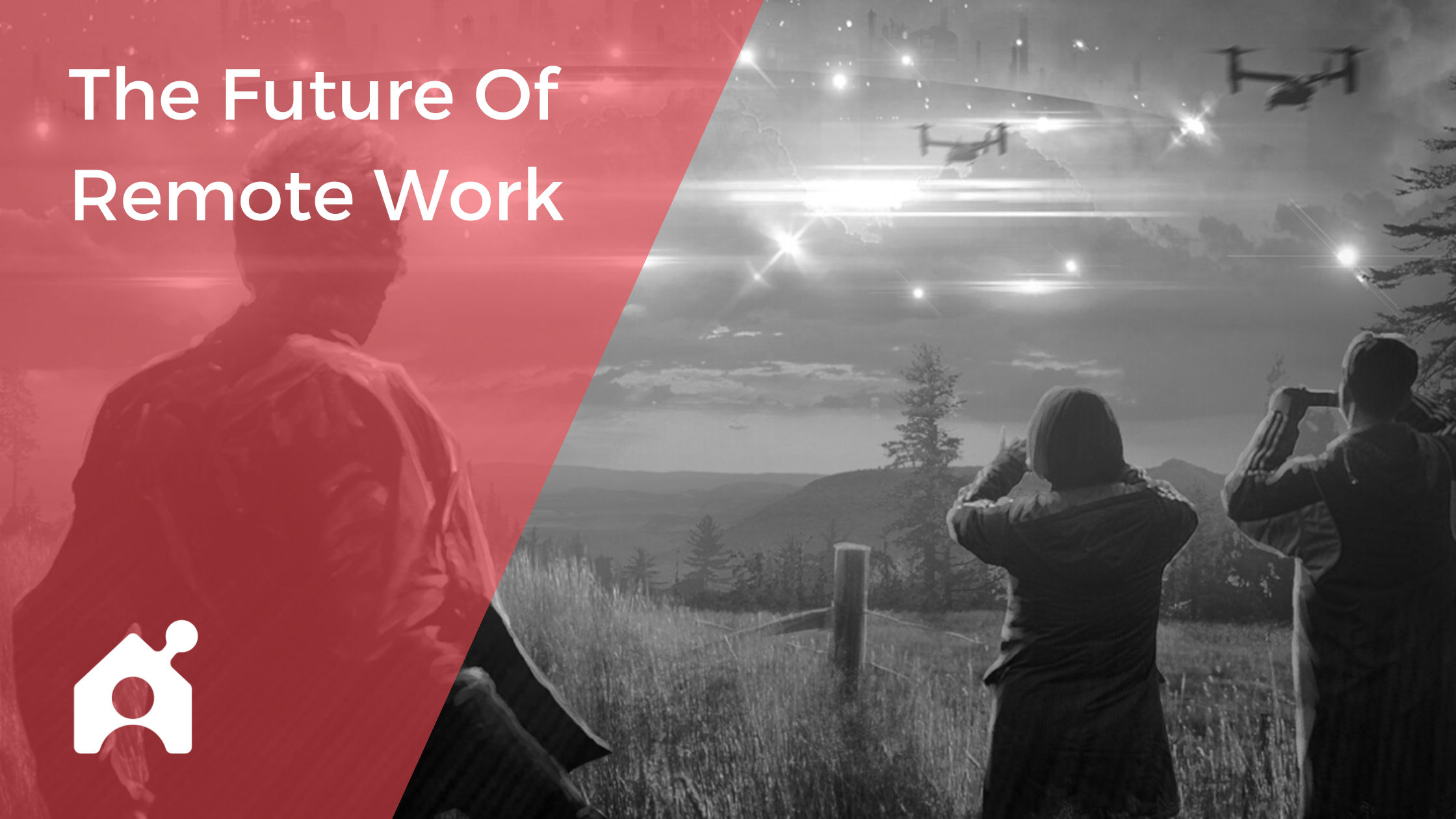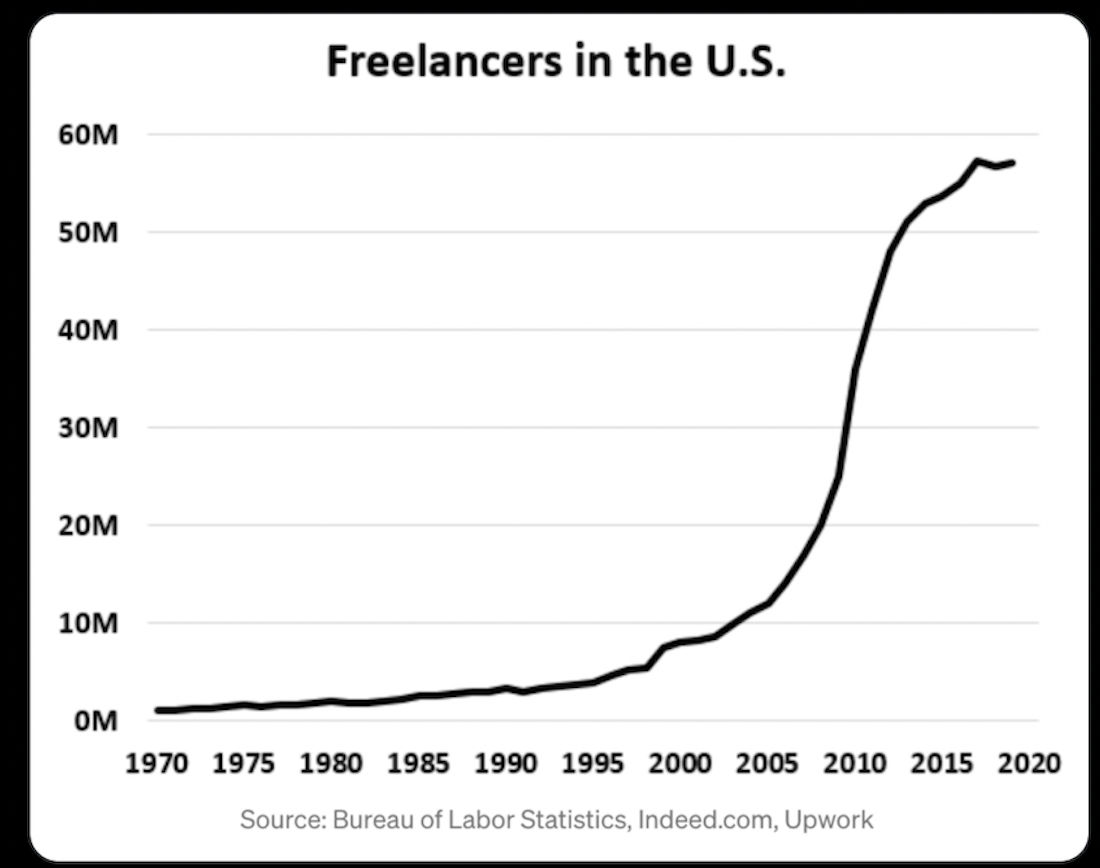The Future Of Remote Work In 16 Steps

The working world has been thrown into a blender the last few years. Most likely, you even started working from home in 2020 after a career in the office. And you like it but have no idea what the future of remote work holds.
- Will remote work continue (like most of us want)?
- Are we all heading back to the office (like most employers seem to want)?
I’ve worked from home for a decade (much longer than COVID’s been around). I’ve seen the positive impacts of remote work on my company, my career, and my vision for the future of work.
I’ve laid out the future ways of work as a result of the remote work revolution in 16 steps. If you only have a minute, here’s where it’s all heading – not only is remote work here to stay, it is merely the first step in a revolution of work to play out in the coming decades.
The Future Of Remote Work
Here’s how remote work will change the world in 16 steps.
1) Every job that can be done remotely will be done remotely.
- In a survey of 158,000 employees, McKinsey found that 87% of workers who were given the option to work remotely chose to do so
- According to a Recruiter.com survey, remote work (27%) is now almost as much of a priority for job seekers as compensation (30%)
- In a PwC survey, only 8% of respondents said they do not want to work remotely (92% do in some form)
People want to work from home. Companies that offer remote work drastically increase their talent pool and decrease their costs (office expense goes to zero). Once the office leases expire, most desk jobs will be done remotely.
2) People will increasingly move to new cities, new states, then new countries.
3) Incomes will be dispersed across the country and then the world.
Right now, there is the threat of the return to office. If your job used to be in an office and now your employer is calling you back 1-3 days per week, your income still has a location-based component. You can’t move yet.
Throughout most of civilization, work has been tied to a location (the farm, the factory, the office). Once most of the knowledge workers in the world are permanently working remotely, they are no longer tied to a physical location. That is a breakthrough in how humans organize like we haven’t seen before.
People will move and take their incomes with them by the millions.
- First, people may move to the suburbs for more space
- Then, they’ll move to a new state for a better cost of living or tax benefits
- Finally, they’ll move to new countries altogether
As an early example in the trend, San Francisco saw its population drop by 6.7% from 2020 to 2021, had 50+ businesses leave between 2020 – 2023, and had its vacant office space increase from 3.7% to 24% (2019 – 2022).
4) The concentration of wealth in specific cities will dissipate.
Throughout history, concentrations of humans (cities) have been built around opportunity – a good harbor allows for trade with other countries, a river allows for goods to be moved within the country, a natural resource has been discovered that can be mined.
In modern civilization, cities often grow based on economic opportunity – all of the car jobs were in Detroit, finance jobs are in New York, tech jobs are in San Francisco. Great wealth has been built by the concentration of economic opportunity.
With remote work, the concentration is no longer required. All of the tech jobs that were in San Francisco can move anywhere in the world. The finance jobs in New York City can move anywhere. This will lower the wealth in major cities and increase the wealth in smaller cities, suburbs, rural areas, and countries with lower costs of living.
5) Governments will grasp at ways to tax.
Income tax laws are designed on the assumption that most people live where they work. The amount of tax you pay is based on your earnings, but who you pay it to is based on your residence.
With the remote work, that assumption has broken.
In steps 2-4, we outlined how people will move and bring their incomes with them. When a few thousand people are doing that (2019 and before), governments ignore the problem, for the most part. When millions of people are moving their income around from place to place each year, the tax laws break.
6) People will leave jobs more frequently since opportunities are all around the world, not just within commuting distance.
In 2019 and before, the common job search looked like this: [Type of job] in [City]. Without knowing it, that “city” component greatly limited the economic opportunity for the job seeker.
However from 2020 to 2021, the percentage of paid job postings on LinkedIn offering “remote work” skyrocketed 357%.
The physical constraint on desk jobs has been lifted. Now people can search for [Type of job] in [anywhere]. With so many more job options, people will move jobs much more frequently. This has been called The Great Resignation or The Great Reshuffle – expect it to last for years, not months.
7) Business travel will plummet, personal travel will increase.
To simply why people prefer remote work over office work, most people do not like to commute. An average commute in America takes 56 minutes round trip (just about one hour). To work for eight hours per day, an addition one hour of waste is required (or 12.5% of your work time). That is not a very efficient system especially considering that remote work removes the wasted commute time completely.
The same concept applies to business travel. To have an in-person meeting across the country, it might take you two full business days and $2,000 of expense to do that in person. Or, it could be done on Zoom for close to $0. Maybe in-person meetings do have benefits, but most of them cannot overcome the built-in time and cost disparity. As a result, business travel peaked at some point before 2020 and will never return.
But people still like to travel, of course. Personal travel will increase since people can take their work with them.
8) The value of commercial real estate will crash.
- 24% of office space sits empty in San Francisco
- 17% of office space sits empty in New York City
- A long list of notable companies are reducing office space
- In the top 10 US cities, offices are being used at less than 50% than they were in early 2020
As Newton’s third law states, “For every action there is an equal and opposite reaction.” As one person switches to remote work, one desk is no longer needed in an office. What used to be one of the most valuable assets – commercial real estate – will become a balance sheet impairment.
Once the office is removed from the average knowledge worker’s day, the old places and patterns will turn into new ones:
- Office buildings will turn into housing and coworking spaces
- Lunch-time restaurants will turn into cloud kitchens
- Commutes will turn into workouts
- Breaks on Facebook at your desk will turn into walks
- In-person time with coworkers will turn into offline time with family/friends
9) Companies will start to reimburse people for their home office.
On a typical income statement, office space would account for the second biggest expense. For hybrid companies, that cost is reduced. For fully remote companies, that cost is wiped away.
But there is a negative for the remote employee – the cost of office space has been shifted from the company’s income statement to the individual’s. When 1-3% of people worked from home, that cost seemed to be acceptable – “Yes, I bought a house with an extra bedroom, but I get to work from home.” When most desk jobs are done from home, this could become a problem.
With remote work, companies are directly more profitable – the cost of office space is gone. But at the same time, #6 (above) will happen – people will job hop much more frequently because there are so many more job opportunities. Companies will use some of the excess profit to reimburse people for their home office expenses. That will shift the cost of office space back to the employer in exchange for an edge in hiring.
10) Companies will start to rethink other previously accepted business principles (like the office).
The office was created as a physical place for people to collaborate on work. Set schedules (like the 9-5) fostered a block of time for people to collaborate. Organizational charts were built to manage output.
Then the internet came along. Communication no longer needed to take place in a physical location. It no longer needed to take place at the same time (asynchronous collaboration works). And if roles are defined enough, middle managers aren’t needed anymore.
Once companies settle into remote work, they’ll start asking questions about the other tools of work beyond the office:
- Do we need middle managers?
- Do we need the five-day work week?
- Do we need to work 40-50 hours per week?
- Do we all need to be on at the same time?
- Do we need employees or should we go with contractors?
Learn more here: The Future Of Work Lies 12,000 Years Ago
11) Good processes will replace most managers.
12) Companies will start to manage and pay on value creation, not hours put in.
13) Each person at the company will turn into their own entrepreneur running that department.
If…
- Everyone is working remotely at the company
- Processes are documented well and accessible by everyone
- Roles are defined well, and…
- Compensation is tied to performance
It turns out not many babysitters are needed anymore. In other words, with well defined processes, roles, and goals, management can be nearly automated (or greatly reduced).
14) Asynchronous work will become the standard way to work.
In our workplace dictionary, we define asynchronous work like this –work being performed by colleagues that does not happen at the same time.
Many companies that have been fully remote far before COVID are now asynchronous. It is a natural progression to realize that people can work whenever they want so long as they do a good job. That means, if one person loves working from 5 – 7 AM then working out, and someone else likes to come on at 10 AM, that is all fine.
The output is what’s important, not the hours logged together.
15) People will have fewer meetings. It becomes obvious how expensive they are.
Meetings are correlated with management – if you have lots of managers, you may have lots of meetings. That’s because most meetings are for the people doing the work to inform the people managing the work what’s going on. When there are fewer managers, there will be fewer meetings.
And when meetings start to come in question, they will be analyzed from a financial standpoint. We want to get the entire company on a Zoom call together for an hour, but that will cost $10,000. Is that worth it?
16) The gig economy and number of freelancers will grow until the majority of workers operate in this way.
The final step in the future of work because of the remote work revolution is for most knowledge workers to be self-employed. If you can deliver a high-quality skill, it might make more sense to do it for multiple companies rather than one. The internet is enabling that to happen, too, through platforms like Upwork.
Here is the trend of freelancers in the United States. In 2000, only about 8 million Americans were freelancers (or self-employed). By 2020, that number was north of 55 million (nearly a 7x increase).

So, is remote work the future?
Remote work is the first step in a new revolution of work that started in 2020. What used to be a desk job in an office (2019 and prior), will look like this in the future…
- Millions of one-person companies
- Working remotely
- Using asynchronous communication
- Setting flexible schedules
